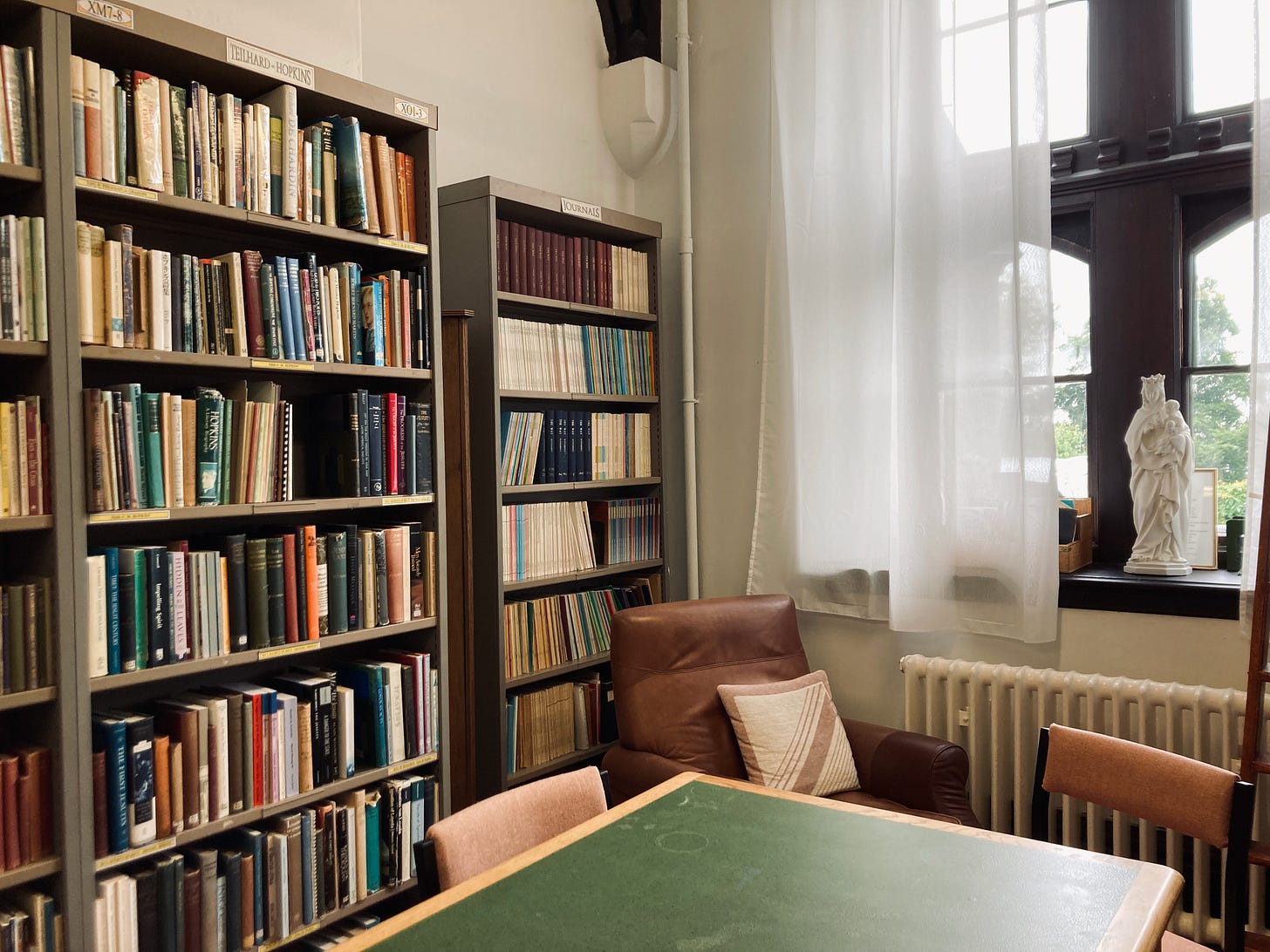attention is the beginning of devotion
a sermon on poetry, attention and the examination of conscience, preached at St Martin-in-the-Fields on January 12th 2022.
The sixth-century Rule of St Benedict begins with the word ausculta. It’s a second-person imperative: it calls someone to listen, to pay attention. In the monasteries of seventh- and eighth-century England, excerpts of Benedict’s rule would have been read aloud each day — though each community drew on various monastic rules to define their own, unique ways of life, they were all grounded in the Benedictine tradition. The earliest English poems, written down by the same monks, often begin with a similar word in Old English: 'Hwaet!’ It is, most famously, the first word of Beowulf, but also begins the poems Juliana, The Fates of the Apostles, Andreas, and others. Hwaet has been translated in a variety of ways: hark! Behold! Lo! Listen! In the most recent translation of Beowulf, Maria Dahvana Headley begins with the word ‘So’. Not an exclamation, maybe, but an opening—the same way we, in speech, frequently begin our sentences: ‘so, I said to them.’ Ausculta. So, listen, turn your attention to this.
Before starting my job at St Martin’s, I went on an eight-day silent retreat at St Beuno’s in North Wales. It’s beautiful there, perched on a steep hill in the Vale of Clwyd, and from my bedroom window I saw the sun flood the valley with golden light, over fields of farmland and country lanes where farmers still speak to each other in Welsh, stretching out to the Irish Sea. It’s where Gerard Manley Hopkins trained to be a priest, where he wrote his favourite poem, The Windhover:
I caught this morning morning's minion, king-
dom of daylight's dauphin, dapple-dawn-drawn Falcon, in his riding
Of the rolling level underneath him steady air, and striding
High there, how he rung upon the rein of a wimpling wing
In his ecstasy! then off, off forth on swing,
As a skate's heel sweeps smooth on a bow-bend: the hurl and gliding
Rebuffed the big wind. My heart in hiding
Stirred for a bird,—the achieve of; the mastery of the thing!Brute beauty and valour and act, oh, air, pride, plume, here
Buckle! AND the fire that breaks from thee then, a billion
Times told lovelier, more dangerous, O my chevalier!No wonder of it: shéer plód makes plough down sillion
Shine, and blue-bleak embers, ah my dear,
Fall, gall themselves, and gash gold-vermillion.
While I walked across the same hills, I saw hawks circling overhead and felt that I understood Hopkins’ poem for the first time: the beauty of directed attention allowed him to delight in watching a falcon’s flight in the light of the early morning. Nothing especially beautiful about that bird or that morning, but rather in the pure act of being able to take joy in witnessing. Not just seeing a falcon and moving onto the next thing, the next thought, but rooting oneself in that moment, being entirely present to it. When you do this, it’s impossible not to feel a great outpouring of love and wonder: that God has made this world, this falcon, this moment, this self to witness it all.
St Beuno’s is a Jesuit retreat, rooted in the tradition of Ignatian spirituality. The method of prayer promoted by St Ignatius of Loyola is based, essentially, on discernment. It’s about discerning where the Holy Spirit is active in your life each day. Over time, this teaches you to discern where God is calling you: what Jesuits call ‘God’s dream for your life’. A very simple way of practising this is what’s called the Examen, or the examination of conscience. You can do this in five or ten minutes at the end of the day. You find a moment of quiet to reflect on the day and review everything that’s happened. You pay attention to the feelings that come up for you—maybe when you remember one particular interaction, you feel a pang of anger; or maybe a little surge of joy. Then you ask two questions:
What moment today am I most grateful for?
What moment today am I least grateful for?
You can ask these questions in different ways. You can ask:
When did I feel most nourished today?
When did I feel life draining out of me?
Or:
What was the biggest moment of consolation today?
What was the biggest moment of desolation?
The Examen is about identifying what makes your soul thrive, not just about what makes you feel happy. It’s easy to let the days run over us and forget about all the individual moments, the changes in mood, the daily ups and downs. We all have moments where something seems to kick us into life—something hits its mark and there’s an inner excitement, a sense that this is the right thing to be doing—and then we go to make a coffee or we go outside and get annoyed at someone walking too slowly on the way to the tube, and we forget all about it. Ignatian spirituality teaches us to spend time, each day, remembering these moments, reflecting on them. Because they tell us something about who we’re meant to be and what we’re meant to do: God’s dream for our lives.
The twentieth-century philosopher and mystic Simone Weil said that ‘attention is the rarest and purest form of generosity.’ If we want to be who we’re meant to be, she explained, we don’t get there through force of will. If we try to will ourselves to be better, we tighten up like a fist; we try to control things that can’t be controlled. When we make our lists of new years’ resolutions and try to force them into becoming, we’re focusing on the world as it should be, not as it is. She says that attention is the opposite of will. ‘Attention, taken to its highest degree, is the same thing as prayer. It presupposes faith and love. Absolutely unmixed attention is prayer. If we turn our mind toward the good, it is impossible that little by little the whole soul will not be attracted thereto in spite of itself.’
The poet Mary Oliver drew on the same idea when she said, ‘attention is the beginning of devotion.’ Her poems, like those of Hopkins, dwell on the natural world: going out and being in it, watching, attending to it. There is something about nature that invites this kind of attention. In the quiet of nature, it’s easier to let your attention focus on the way the leaves move in the wind, the sound of birds and the rustle of squirrels in the undergrowth, the drifting clouds. You can give your attention fully to the moment. You can notice your thoughts and emotions as they come into your mind and gently turn your attention back to the moment you’re in: the feeling of the grass beneath your feet, the chill of the wind against your face. There is a certain calm, a sense of peace—and a gratitude, a sense of love for the world—that happens when you turn away from distractions and simply let yourself be.
It’s not only in nature that we can do this. The purpose of Ignatian spirituality is to train yourself to be attentive in every part of your life, whether this is in the small decisions you make about what to say in conversation, or the big decisions about what job to do, where to go next. It’s about becoming aware of the wild and persistent love which underlies everything, which we call the Holy Spirit. The world is not made up of sacred places and empty, unsacred ones—all of reality is sacramental, enlivened by God’s creative love for the world, shot through with grace. We don’t discover that by an effort of will: by concentrating really hard and beating ourselves up for not being quiet enough or prayerful enough or good enough. We just have to give our attention.
While I was at St Beuno’s, I was told not to spend too much time in the library—because when I arrived I had big ambitions like reading the entire Old Testament or getting really into Augustine. I didn’t entirely take this advice, but I did try to focus on poetry—which requires a different, more attentive kind of reading. One of the poets I read was R.S. Thomas, a Welsh priest who spent most of his life in the same hills and valleys of North Wales. He was a grumpy, often fed-up man, whose twin passions were hating technology and England. But many of his poems are about the kind of love that proceeds from attention: how his rough, uneducated parishioners irritate him until he really takes time to pay attention to them. And then he sees in them something of the wonder of God’s creation, the outpouring of love. Attention is the rarest and purest form of generosity. It’s an act of giving that directs us away from our petty hang-ups and bitterness, towards love.
In Thomas’s poem The Moor, he writes:
It was like a church to me.
I entered it on soft foot,
Breath held like a cap in hand.
It was quiet.
What God was there made himself felt,
Not listened to, in clean colours
That brought a moistening of the eye,
In movement of the wind over grass.There were no prayers said. But stillness
Of the heart’s passions — that was praise
Enough; and the mind’s cession
Of its kingdom, I walked on,
Simple and poor, while the air crumbled
And broke on me generously as bread.






Complements much of what I've been thinking about, thanks for writing this.
were those pictures taken by you or taken from somewhere else? they really complement the beautiful prose and stuff ^^